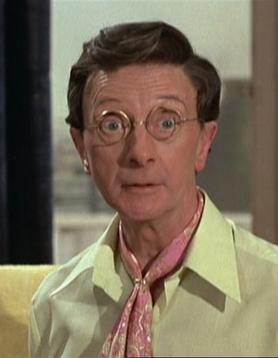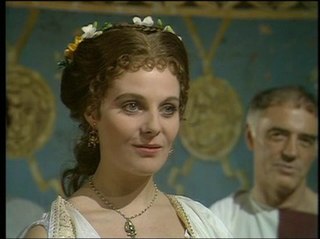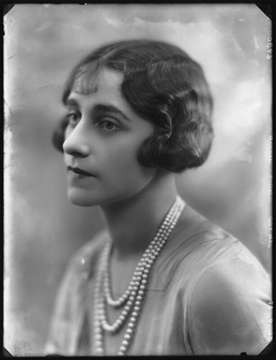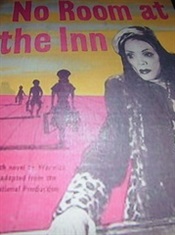Related Research Articles

Joan Mary Waller Greenwood was an English actress. Her husky voice, coupled with her slow, precise elocution, was her trademark. She played Sibella in the 1949 film Kind Hearts and Coronets, and also appeared in The Man in the White Suit (1951), Young Wives' Tale (1951), The Importance of Being Earnest (1952), Stage Struck (1958), Tom Jones (1963) and Little Dorrit (1987).

The Women is a 1936 American play, a comedy of manners by Clare Boothe Luce. The cast includes women only.

George Frederick Joffre Hartree, known as Charles Hawtrey, was an English actor, comedian, singer, pianist and theatre director.

William Brian de Lacy Aherne was an English actor of stage, screen, radio and television, who enjoyed a long and varied career in Britain and the United States.

Dora May Broadbent,, known as Dora Bryan, was a British actress of stage, film and television.

Lilian Ridgway, known professionally as Lynda Baron, was an English actress and singer. She is known for having played Nurse Gladys Emmanuel in the BBC sitcom Open All Hours (1976–1985) and its sequel, Still Open All Hours (2013–2016), Auntie Mabel in the award-winning children's series Come Outside (1993–1997), and the part of Linda Clarke in EastEnders in 2006 and from 2008 to 2009, with a brief return in 2016.

Lux Video Theatre is an American television anthology series that was produced from 1950 until 1957. The series presented both comedy and drama in original teleplays, as well as abridged adaptations of films and plays.
Jonathan Rigby is an English actor and film historian who has written several books. Video Watchdog magazine described him as occupying "a proud place in the advance guard of film researchers, writers and critics," and in 2020 he was inducted into the Rondo Hatton Classic Horror Awards Hall of Fame.

Sheila Susan White was an English film, television and stage actress.

Miriam Karlin was an English actress whose career lasted for more than 60 years. She was known for her role as Paddy in The Rag Trade, a 1960s BBC and 1970s LWT sitcom, and in particular for the character's catchphrase "Everybody out!" Her trademark throughout her career was her deep, rough, and husky voice.
Maria Zena Schneider, known professionally as Maria Charles, was an English film, television and stage actress, director and comedienne. She was probably best known for her performance as the overbearing mother Bea Fisher in the ITV sitcom Agony. Charles also appeared on the stage in original West End productions including musicals by Stephen Sondheim, Charles Strouse and Sandy Wilson.

Irene Lilian Brodrick, Countess of Midleton was a British stage and screen actress of the 1930s, 1940s and 1950s and also a novelist.

Eva Elisabet Dahlbeck was a Swedish stage, film, and television actress. She received a Cannes Film Festival Award for Best Actress for her performance in the film Brink of Life (1958). Dahlbeck retired from acting in 1970 and became an author.

Alison Joy Leggatt was an English character actress.

Freda Maud Jackson was an English stage actress who also worked in film and television.

The White Bear Theatre is a fringe theatre founded in 1988 at the White Bear pub in Kennington, London, and run by Artistic Director and founder Michael Kingsbury. It is one of London's leading pub theatres, as well as one of the longest established, dedicated since inception to both new writing and to its Lost Classics Project, which focuses on productions of obscure historical works.
Anthony John Hawtrey was an English actor and stage director. He began his acting career in 1930 and began directing by 1939. As director of the Embassy Theatre in London, his productions sometimes achieved enough success to transfer to the West End. During his theatre career, Hawtrey also acted in television and on film. He was a member of the Terry family of actors.

No Room at the Inn is a 1945 play by Joan Temple that became a 1948 film directed by Daniel Birt. Both play and film are presented in flashback mode and share the same subject matter – cruelty, neglect and mental and physical abuse meted out to evacuee children during World War II. Temple's attack on those who turn a blind eye to child abuse, be they public officials or private individuals, was considered frank and uncompromising in its time.

Vida Hope was a British stage and film actress, who also directed stage productions.
Women of Twilight is a 1952 film directed by Gordon Parry starring Freda Jackson, Rene Ray and Lois Maxwell, with a screenplay by Anatole de Grunwald. It was based on the 1951 play by Sylvia Rayman. It was the first British film to receive the recently introduced X certificate.
References
- ↑ Frances Stephens, Theatre World Annual (London), Rockliff Publishing Corporation, 1952
- ↑ 'Who's Who in the Cast', Women of Twilight programme, Playbill Inc, March 1952
- ↑ Tony Aldgate, 'Women of Twilight, Cosh Boy and the advent of the 'X' certificate', Journal of Popular British Cinema March 2000
- ↑ Sylvia Rayman, Women of Twilight: An All-women Play, Evans Plays, Evans Brothers Ltd, 1952
- ↑ Oscar Lewenstein, Kicking Against the Pricks: A Theatre Producer Looks Back, London: Nick Hern Books, 1994
- ↑ 'Our Critic's First-Night Journal', The Illustrated London News, 27 October 1951
- ↑ 'Study in Evil', West London Observer, 16 November 1951
- ↑ 'London in Entertaining Mood', The Illustrated Sporting and Dramatic News, 28 November 1951
- ↑ 'Chit Chat', The Stage, 5 June 1952
- ↑ 'British Play Repulsive', Coventry Evening Telegraph, 4 March 1952
- ↑ "HOME - Women of Twilight". Archived from the original on 13 August 2020.
- ↑ "WOMEN OF TWILIGHT Transfers to the Pleasance from the White Bear Theatre; Runs April 14–27".
- ↑ unsigned review, The Stage, 18 October 1951
- ↑ J. C. Trewin in The Observer, 21 October 1951
- ↑ Iain Hamilton in The Spectator, 18 October 1951
- ↑ unsigned review, The Daily Telegraph, 16 October 1951
- ↑ unsigned review, The Stage, 15 November 1951
- ↑ Frances Stephens in Theatre World, January 1952
- ↑ unsigned review, The Stage, 26 June 1952
- ↑ BFI.org
- ↑ "Mulheres do Crepúculo". IMDb . 13 January 1963.